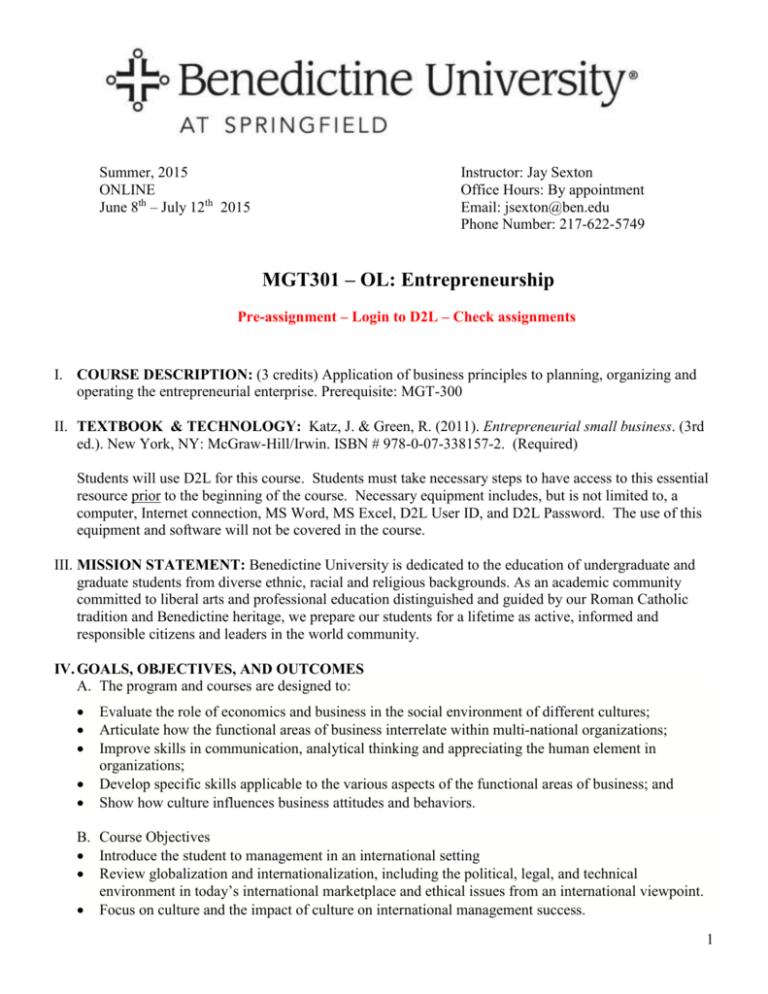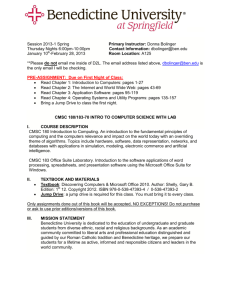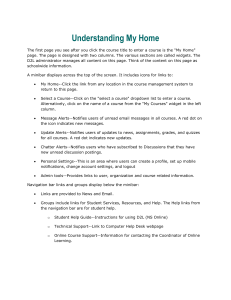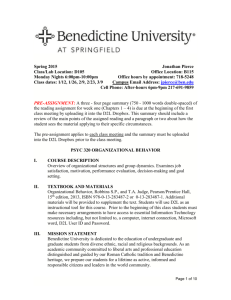Springfield College in Illinois
advertisement

Benedictine University at Springfield ECON 101-70 Principle of Macroeconomics (Online) Summer, 2015 ONLINE June 8th – July 12th 2015 Instructor: Jay Sexton Office Hours: By appointment Email: jsexton@ben.edu Phone Number: 217-622-5749 MGT301 – OL: Entrepreneurship Pre-assignment – Login to D2L – Check assignments I. COURSE DESCRIPTION: (3 credits) Application of business principles to planning, organizing and operating the entrepreneurial enterprise. Prerequisite: MGT-300 II. TEXTBOOK & TECHNOLOGY: Katz, J. & Green, R. (2011). Entrepreneurial small business. (3rd ed.). New York, NY: McGraw-Hill/Irwin. ISBN # 978-0-07-338157-2. (Required) Students will use D2L for this course. Students must take necessary steps to have access to this essential resource prior to the beginning of the course. Necessary equipment includes, but is not limited to, a computer, Internet connection, MS Word, MS Excel, D2L User ID, and D2L Password. The use of this equipment and software will not be covered in the course. III. MISSION STATEMENT: Benedictine University is dedicated to the education of undergraduate and graduate students from diverse ethnic, racial and religious backgrounds. As an academic community committed to liberal arts and professional education distinguished and guided by our Roman Catholic tradition and Benedictine heritage, we prepare our students for a lifetime as active, informed and responsible citizens and leaders in the world community. IV. GOALS, OBJECTIVES, AND OUTCOMES A. The program and courses are designed to: Evaluate the role of economics and business in the social environment of different cultures; Articulate how the functional areas of business interrelate within multi-national organizations; Improve skills in communication, analytical thinking and appreciating the human element in organizations; Develop specific skills applicable to the various aspects of the functional areas of business; and Show how culture influences business attitudes and behaviors. B. Course Objectives Introduce the student to management in an international setting Review globalization and internationalization, including the political, legal, and technical environment in today’s international marketplace and ethical issues from an international viewpoint. Focus on culture and the impact of culture on international management success. 1 Examine strategy formulation, entry, and risks for international management. Discuss human resource and motivational issues across cultures. V. TEACHING METHODS: This class will be completed online using D2L (including discussion board, PowerPoint slides, assignments, etc.) Students should monitor various news outlets for entrepreneurial information that relates to the topics covered in the course. VI. COURSE REQUIREMENTS A. Attendance/Participation – Students are expected to visit D2L for course information on a weekly basis (preferably daily) to fully understand upcoming assignments. Attendance and participation will be monitored through discussion board activity and weekly journal entries. This course is highly accelerated, and students will need to take a great deal of responsibility for their own learning outcomes. Attendance is required in each class meeting for the full period of time. Any absence must be due to extraordinary circumstances and will require documentation for it to be considered excused. Documentation must be provided immediately in order to determine what, if any, accommodations are reasonable or possible. Class attendance will directly impact your final grade, and each undocumented absence will be considered unexcused and will result in a 20% reduction in the final grade for the course. Due to the accelerated nature of the course, should you experience a medical condition which prevents you from attending any class(es), appropriate medical documentation must be provided immediately so it may be determined what, if any accommodations are reasonable or possible. B. Reading Assignments – Reading assignments in the textbook are listed in the Course Outline. The instructor reserves the right to alter the reading schedule listed in this syllabus. If this occurs, an announcement will be posted on D2L. Articles from various outside sources which relate to the subject matter may be assigned throughout the course. C. Written Assignments – Students are expected to complete a variety of written assignments for this course, including discussion posts, weekly journal entries, exams, and a final paper. Writing skills will be a significant portion of the final paper evaluation. 1. Exams will consist of a combination of multiple choice and True/False questions. The Final exam will not be cumulative. Students should closely follow any instructions posted with the exam. 2. Detailed instructions for weekly assignments will be posted on D2L in the Assignments Section. Please note the due dates to avoid penalties. 3. Guidelines for the final paper will be posted to D2L. D. Makeup Work – No makeup exams will be given – exams must be completed by the stated time on the syllabus and submitted according to instructions. It is the student’s responsibility to monitor all due dates. No additional reminders will be sent to the students. The syllabus is your reminder. Late work (written assignments and/or homework) will result in an automatic 25% reduction in the assignment grade and will not be accepted more than 48 hours past the due date and time. All assignments must be submitted via D2L – not by e-mail to the instructor. Instructions in D2L must be followed closely. 2 E. Classroom Etiquette – Students are expected to exhibit respect and courtesy through any posts or other interactions on D2L. Failure to do so will result in a loss of points for the assignment. Benedictine University at Springfield Student Academic Honesty Policy The search for truth and the dissemination of knowledge are the central missions of a university. Benedictine University at Springfield pursues these missions in an environment guided by our Roman Catholic tradition and our Benedictine heritage. Integrity and honesty are therefore expected of all University students. Actions such as cheating, plagiarism, collusion, fabrication, forgery, falsification, destruction, multiple submission, solicitation, and misrepresentation are violations of these expectations and constitute unacceptable behavior in the University community. Student’s Responsibility Though there is no formal honor code at Benedictine University at Springfield, students are expected to exhibit academic honesty at all times. Violations against academic honesty are always serious and may result in sanctions that could have profound long-term effects. The final responsibility for understanding the Academic Honesty Policy of the institution, as well as the specific policies for individual courses normally found in syllabi, rests with students. If any doubt exists about what constitutes academic dishonesty, students have the responsibility to talk to the faculty member. Students should expect the members of their class to be academically honest. If students believe one or more members of the class have been deceitful to gain academic advantage in the class, students should feel comfortable to approach the faculty member of the course without prejudice. Violations of the Academic Honesty Policy will be reported to the Office of the Dean of Academic Affairs. Along with a verbal warning, the following are consequences a student may face for academic dishonesty: a failing grade or “zero” for the assignment; dismissal from and a failing grade for the course; or dismissal from the Institution. VII. COURSE EVALUATION A. Grading Scale: 90% - 100% = A 80% - 89.9% = B 70% - 79.9% = C 60% - 69.9% = D Below 60% = F B. Means of Evaluation of Outcomes: Discussion Participation (40 points per week) Journal Entries (20 points per week) Weekly Quizzes (20 points per week) Paper Draft (200 points) Final Paper (400 points) TOTAL 200 points 100 points 100 points 200 points 400 points 1000 points Grade Appeal Process If a student believes that an error has been made in reporting a grade, an appeal must be made in writing to the instructor and must be initiated within 60 calendar days after the end of the term for which the grade in question was reported. The appeal should contain specific information about why it is believed the grade reported is inaccurate. See the Student Handbook for additional details. 3 Add/Drop Dates Please refer to the current Academic Calendar for add/drop dates. Incomplete Request To qualify for an “I” grade, a minimum of 75% of the course work must be completed with a passing grade, and a student must submit a completed Request for an Incomplete form to the Registrar’s Office. The form must be completed by both student and instructor, but it is the student’s responsibility (not the instructor’s) to initiate this process and obtain the necessary signatures. Student Withdrawal Procedure It is the student’s responsibility to officially withdraw from a course by completing the appropriate form, with appropriate signatures, and returning the completed form to the Advising Office. Please refer to the Student Handbook for important financial information related to withdrawals. VIII. COURSE OUTLINE: The course calendar is tentative. Changes from the listed schedule will be posted on D2L. Week Chapter Topics Assignments/Assessments 1–4 (you Rewards and Opportunities, Ethics, The External may skip Environment, Skill Needed modules) Due June 14th by 11:00PM Quiz 1 Journal Entry Discussions Week # 2 June 15th – June 21st 5–8 (you Path to Entry, Business Plans may skip modules) Due June 21st by 11:00PM Quiz 2 Journal Entry Discussions Week # 3 June 22nd – June 28th 9 – 12 (you Marketing, Marketing Plans may skip modules) Due June 28th by 11:00PM Quiz 3 Journal Entry Discussions Week # 1 June 8th – June 14th Week # 4 June 29th – July 5th Week # 5 July 6th – July 12th 13 - 16 17 - 20 Due July 5th by 11:00PM Quiz 4 Cash and Accounting, Finance Options, Inventory Journal Entry Control, Operations Management Discussions First Draft of Paper Risk and Insurance Options, Legal Issues, Human Resource Management, Measuring Success Due July 12th by 11:00PM Quiz 5 Journal Entry Discussions Final Draft of Paper 4 Discussion Questions: Discussion questions for each week will be posted in the Discussion section on D2L. Students are expected to post at least 1 response to each discussion question each week and respond to at least 1 other student’s response (not one per each question, just one total). Discussion board activity should be thoughtful and demonstrate that the student has spent time considering the subject, not just a simple “Yes, I agree.” Journal Entries: The purpose of journal entries is for the instructor to “touch base” with the students. These will be submitted under Assignments on D2L. They should be short and contain the following information. 1. Explain and “relate to the real world” a key concept you learned that week. 2. What difficulties are you experiencing with this class? What is going well? 3. What suggestions do you have for improving the class or the presentation of the material? Weekly Quizzes: There will be five quizzes. Each quiz may be found under the Content on D2L. Quizzes must be completed each week by Sunday at 11:00 pm. Quiz 1 covers features of the syllabus to make sure student’s grasp what is expected of them in this course. It is not timed. Quizzes 2 - 5 each cover reading material from the current week. The quizzes are not cumulative. The quizzes will consist of 10 fill-in-theblank, matching, multiple-choice and/or true-false questions for a total of twenty points per quiz. Students have all week to prepare and schedule the quizzes around their other activities. Therefore, late quizzes will not be accepted and the student will receive a grade of zero. Draft Paper: The first draft of your final paper must be submitted to SmartThinking for review and feedback. If you are not familiar with SmartThinking the Resource Center should be able to assist you. Given that the feedback process can take up to 72 hours, the student should prepare the draft during Week 3 or no later than the beginning of Week 4. This will allow the student to submit the paper and get proof of feedback for the instructor by the 11:59pm on Week 4. The student will submit to D2L’s Dropbox 1) a draft of the final paper along with 2) some form of proof that SmartThinking has reviewed the draft and given recommendations to the student by 11:59pm on Week 4. The draft grade will be based upon 1) how much of the paper was submitted, minimal 50 points, most 100 points, all of the paper including citations and references pages 150 points. The final 50 points are for the proof of review by SmartThinking. On time proof is worth all 50 points. Any late submissions of the proof will lose 10 points per day late. Final Paper: Students will have one major activity that weaves throughout the course of the class. Students will be interviewing at least three local entrepreneurs about their varying backgrounds, business issues, and entrepreneurial approaches. Each interview will last about 30 minutes at a specific time prearranged at the student’s initiative to meet the entrepreneur’s schedule. These interviews will ideally be in person, however, phone interviews are at the discretion of the parties involved should no viable live times be available. The volunteer entrepreneurs’ time is valuable so please do not be late for an interview. Violators will lose a full letter grade on their final paper. Students may begin scheduling interviews as soon as they choose, but they must all be complete before the final paper is due Week 5. The final paper will be a comparative look at the different concepts of entrepreneurship as exhibited or discussed by the entrepreneurs. It will utilize the notes taken during the interview process. The student should cite the textbook frequently and include a significant number of concepts from the text. The weekly journal will be a good source of concepts that any particular student might like to explore, but the paper need not be limited by those items in the journal. The paper is not to be a description of what you liked or disliked about the entrepreneur. It is also not a discussion of whether this was a fun and 5 informative exercise. It is to be a practical look at the theoretical concepts presented by the textbook. But, I do hope you enjoy the entrepreneurs and that the exercise proves to be fun and rewarding. The paper must be prepared on a computer with Microsoft Word and submitted via D2L’s Dropbox. It must be in formal APA or MLA (see the Resource Center if you have questions on these formats.) There should be a separate cover page. No abstract is needed. The only work cited will be the textbook, but a minimum of six short quotations are required. Quotations exceeding 15 words better add real value and not just serve as filler to meet the minimum word length of 1500 – 3000 words. Note: You need only cite the entrepreneurs once since they are the bulk of the paper and there could be a ridiculous number of citations in the papers as a result. The paper will be evaluated on textbook content (40%), examples and insights from the entrepreneurs (40%), and grammar, syntax, spelling, organization, style, etc. (20%). Late papers will not be accepted. IX. AMERICANS WITH DISABILITIES (ADA) Benedictine University at Springfield provides individuals with disabilities reasonable accommodations to participate in educational programs, activities, and services. Students with disabilities requiring accommodations to participate in campus-sponsored programs, activities, and services, or to meet course requirements, should contact the Resource Center as early as possible: springaccess@ben.edu or (217) 718-5007. X. ASSESSMENT: The weekly journal entry will assist the instructor in assessing student progress. Jr 5/14 Lsa 5/14 Lsa 4-30-15 6






